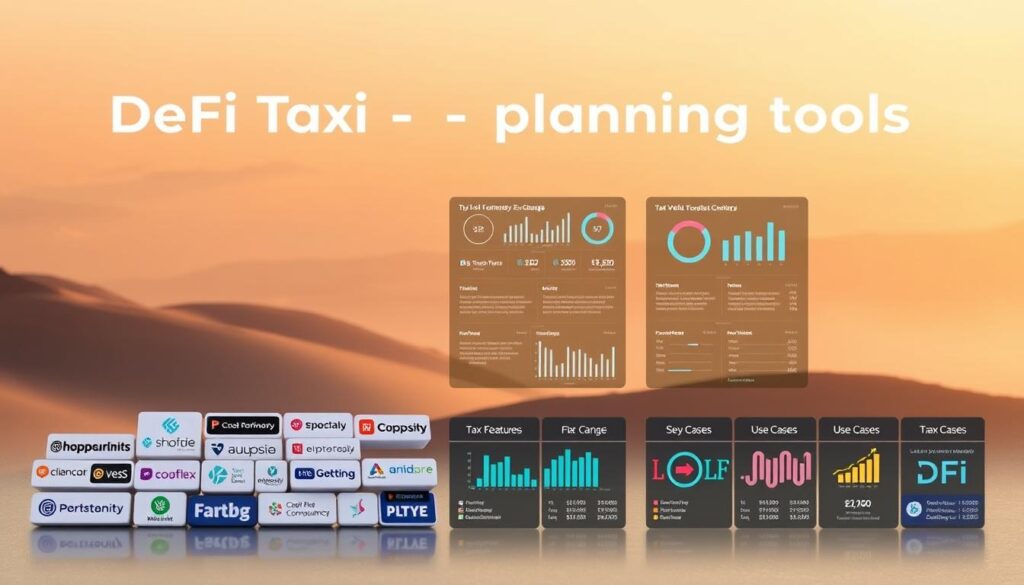Crypto investors deal with tough tax rules for trades, sales, and holdings. The best crypto tax tools make tracking gains, losses, and IRS reports easier. They automate calculations, cutting down on mistakes and saving time. This guide will help you find the top crypto tax filing tools for easy compliance.
Manual methods are prone to errors and take too long as rules change. The right crypto tax software makes sure you file Form 8949 and Schedule D correctly. This article will show how these tools make compliance easier, what features are key, and compare top options to help you choose wisely.
Key Takeaways
- Complex crypto transactions need special tax tools for accurate reporting.
- Cryptocurrency tax software automates calculations to avoid IRS penalties.
- Best crypto tax filing tools reduce manual work and improve compliance.
- Key features include automatic data import and Form 8949 generation.
- Choosing the right tool ensures efficient tax preparation and audit readiness.
Understanding Why Crypto Tax Compliance Matters
Cryptocurrency investors must focus on IRS crypto tax compliance to avoid legal and financial risks. The IRS views crypto as property, requiring detailed tax reporting for cryptocurrencies for every trade or transaction. Not following these rules can lead to penalties and audits, making it crucial to learn about them.
IRS Guidelines for Cryptocurrency Taxation
IRS rules classify crypto as taxable property. Every sale, exchange, or fork triggers capital gains or losses. Taxpayers must report these on Form 8949, noting dates, proceeds, and cost basis. Ignoring these steps can lead to penalties.
Potential Penalties for Non-Compliance
- Failure-to-file penalties can reach 25% of owed taxes per month
- Willful neglect may incur 40% accuracy-related penalties
- Criminal charges apply in cases of intentional evasion
These consequences show why accurate tax reporting for cryptocurrencies is urgent. Audits now target crypto portfolios, with the IRS using new data tools to find discrepancies.
Recent Changes in Crypto Tax Regulations
The 2021 Infrastructure Act requires exchanges to report crypto transactions over $10,000. New IRS guidance clarifies staking, airdrops, and DeFi taxation. These updates mean taxpayers must stay informed to avoid violations. Compliance demands adapting to evolving rules while maintaining precise records.
The Challenge of Manual Crypto Tax Reporting
Tracking crypto transactions for taxes is a big headache. Investors deal with trades on many platforms, making it hard to keep track. Without cryptocurrency tax software, figuring out gains or losses is like solving a puzzle.
Even simple trades, like swapping ETH for BTC, are complicated. Tax forms don’t make these calculations easy.
- Tracking trades across 10+ exchanges and wallets demands constant data entry
- Cost basis errors rise when assets are transferred between platforms
- DeFi activities like liquidity pools create hybrid assets with unclear valuation
- Year-end reconciliation often reveals overlooked transactions
Staking rewards, airdrops, and NFT sales make things even more complicated. For instance, swapping tokens on Uniswap can create taxable events that manual tax reporting for cryptocurrencies systems often miss. Traders with 50+ transactions a month spend hours on paperwork, risking big mistakes.
These challenges show why even seasoned investors find it hard to follow IRS rules without the right tools. The next section will look at how automated solutions can help without needing accounting skills.
How the Best Crypto Tax Tools Save You Time and Money
Automated tax solutions for crypto make tracking trades easy. The best tools handle thousands of transactions in seconds, without manual entry. They connect with exchanges, wallets, and DeFi platforms, catching every detail.

- Automation Benefits: Tools like CoinLedger or Koinly automatically sort swaps, staking rewards, and NFT sales. They apply tax rules across different places, making it easy for global users.
- Error Reduction: Mistakes cost time and money. Software stops errors like wrong FIFO/LIFO tracking or counting airdrops twice.
Manual prep costs a lot. Hiring a crypto-savvy CPA can cost $800–$1,500 a year. But, platforms like CoinTracker offer subscriptions for $49–$149 a year. They give 24/7 access to reports ready for audits, saving 70%+ compared to CPA fees.
Time savings are huge too. A 2023 study found manual filers spend 20+ hours on data reconciliation. But, automated tools cut this time to under an hour. This means more time for growing investments, not just paperwork.
Essential Features to Look for in Cryptocurrency Tax Software
When picking the right cryptocurrency tax software, look at its core features. First, see how many exchanges and wallets it supports. Choose tools that work with big names like Coinbase or Binance to make data import easy.
- Transaction Handling: Make sure it handles swaps, airdrops, and staking rewards right.
- Calculation Precision: Tools with advanced algorithms help track gains and losses more accurately.
- Accounting Methods: It should support FIFO, LIFO, or HIFO to follow IRS rules.
- Reporting Tools: It should make IRS Form 8949 and Schedule D reports easily.
- User Experience: A good interface makes managing complex portfolios easier.
Top crypto tax tools also manage DeFi yield farming or NFT sales. Security is key: look for encryption and two-factor authentication. Prices vary, with some free for basic users and others for advanced features.
For those with lots of trades, features like audit trails and customizable cost basis tracking are crucial. AI-driven crypto tax management solutions can save time by automating complex transaction analysis. Focus on features that fit your specific needs to avoid legal issues and make year-end reporting smoother.
Top Rated Best Crypto Tax Tools for 2023
Finding the best crypto tax tools means picking the right one for you. These top apps and calculators make following tax rules easier. They offer special features for different types of investors.
CoinTracker: Best for Beginner Investors
CoinTracker is easy to use and has all the crypto tax tools you need. It helps new users by guiding them through setting up their accounts. It offers a free version and paid plans start at $29/year, with support and IRS forms.
CoinLedger (Formerly CryptoTrader.Tax): Best for DeFi Users
CoinLedger is great for those into DeFi, like staking and NFTs. It supports over 500 tokens and keeps detailed records. Plans start at $129/year and include help from CPAs.
TokenTax: Best for High-Volume Traders
TokenTax is perfect for traders who buy and sell a lot. It helps with tax planning and exports forms for you. The $299/year plan offers live support and easy API imports.
Koinly: Best Value for Most Users
Koinly is a good deal for most people, with a $29/year plan for 200 transactions. It goes up to $99 for unlimited. It also has a free version for basic tracking.
ZenLedger: Best for Integration Capabilities
ZenLedger connects with over 50 exchanges, making tracking easy. Its $79/year plan includes Form 8300 support and automatic portfolio updates. It’s great for users of many platforms.
Free vs. Paid Crypto Tax Calculators: What’s the Difference?
Free crypto tax calculators help track basic transactions but have big limits. Paid options offer advanced features that serious investors need. Knowing the difference helps pick the right tool for your portfolio.
Limitations of Free Options
- Transaction Caps: Free crypto tax calculators often limit you to 50-100 transactions a year.
- Limited Exchange Support: Free versions might not support big names like Gemini or Kraken, so you have to enter transactions manually.
- No Customer Support: Without paid plans, you can’t get help with data imports or missing transactions.
- Basic Reporting: Free versions only give simple IRS Form 8949 summaries. They don’t integrate with Schedule D.
When to Choose Paid Solutions
Upgrade when:
- You have more than 100 transactions a year, hitting free tool limits.
- You’re into DeFi staking or NFT trading and need special tracking.
- You want advanced features like cost basis optimization or tax-loss harvesting.
- You need detailed reports for complex holdings or tracking assets worldwide.
Paid plans from top crypto tax tools like CoinTracker or ZenLedger offer top security and IRS audit compliance. They’re worth it for big portfolios or traders who file often. They help avoid expensive mistakes.
How Crypto Tax Management Platforms Handle Different Transaction Types
Crypto tax management platforms make it easier to follow IRS rules by sorting out each transaction type. They help users who trade, mine, or just hold crypto assets. For instance, spot trades are seen as property exchanges, with gains figured out based on cost basis.
Margin trading and futures contracts need special care because of the borrowed assets. This makes figuring out profits more complex.
- Staking rewards: Platforms like CoinLedger and Koinly treat rewards as taxable income right when they’re received.
- Airdrops and hard forks: Crypto tax software flags these events for reporting, even if they’re considered constructive receipt under IRS rules.
- NFT transactions: Platforms distinguish collectibles from investment assets, applying capital gains rules when sold.
Software like TokenTax automates calculations for DeFi earnings, tracking both principal and reward tokens separately. Mining income is recorded as taxable revenue from the moment crypto is received into a wallet. Users avoid errors by letting platforms like ZenLedger compute wash sale rules for crypto-to-crypto swaps.
Each transaction type is logged with timestamps and blockchain data to meet audit requirements. Choosing the right cryptocurrency tax software ensures all activities—from DeFi yield farming to NFT sales—are reported correctly. This prevents penalties from overlooked transactions.
Integration Capabilities: Connecting Your Exchanges and Wallets
Connecting crypto platforms with tax tools is key for tracking trades and transfers. Automated tax solutions for crypto make this easier with two ways: API connections or manual CSV uploads.
Direct API Connections vs. CSV Imports
APIs give real-time data from exchanges, cutting down on manual work. Tools like ZenLedger and Koinly get data from Coinbase and Binance automatically. CSV imports are for exchanges not supported by APIs, but they need manual updates.
Always check if apps use encrypted APIs to keep your login info safe.
Supported Exchanges and Blockchain Networks
Top crypto tax apps differ in what they support. ZenLedger works with 50+ exchanges and 10+ blockchains, including Ethereum and Solana. Koinly also supports Polygon and Avalanche, while TokenTax handles DeFi protocols.
Make sure your exchanges are listed before picking software. If they’re not, you’ll have to do everything by hand.
Troubleshooting Common Integration Issues
Here’s how to solve common problems:
- API permission denied: Go back to exchange settings and reauthorize.
- Missing transactions: Check the date range or import a full history CSV file.
- Duplicate entries: Use filters to exclude duplicates.
Keep checking your connections to avoid mistakes in Form 8949 reports.
Handling Complex Scenarios: DeFi, NFTs, and Staking
When you’re into DeFi, NFTs, and staking, you need to plan your crypto taxes carefully. Tools like CoinLedger make tax reporting for cryptocurrencies easier by doing the math for you. For DeFi, they track rewards from providing liquidity as income. Gains from yield farming might be seen as capital gains. 
- DeFi: Track liquidity pool swaps and borrowing fees. CoinLedger’s DeFi tax guide explains how rewards are taxed as ordinary income under IRS rules.
- NFTs: Tools calculate net gains by combining creator royalties and gas fees. Sales show taxable profits after subtracting minting costs and marketplace fees.
- Staking: Platforms like Koinly classify rewards as income, while some tools let users choose between income or capital gains methods.
Choosing the right software is key. If you need to manually enter staking rewards, pick a platform with customizable cost-basis options. For NFT creators, make sure the tool includes royalty streams in cost basis. Always check your reports before filing to avoid IRS issues.
Crypto Tax Reporting Throughout the Year: Best Practices
Good cryptocurrency tax planning is more than just filing at the last minute. It’s about having strategies all year round. This way, you stay compliant and save money. The best crypto tax filing tools make it easier, helping you keep track all the time.
Quarterly Estimation Strategies
Use tax software to guess your payments every three months. Tools like CoinLedger help you track your trades and figure out what you owe. Make sure to adjust your guesses as your crypto grows, so you don’t get hit with penalties.
Ongoing Portfolio Monitoring
Keep an eye on your tax situation with dashboards from Koinger. They show you the gains and losses in real-time. This way, you can plan your trades better and avoid surprises at tax time.
Tax-Loss Harvesting Opportunities
Tools like TokenTax can help you harvest losses automatically. They find the assets that are worth less and suggest selling them. For example, selling a crypto at a loss can lower what you owe in taxes. Visual tools help you know when to sell for the best effect.
Data Security Considerations When Choosing Tax Apps
When picking secure crypto tax tools, it’s key to check how they protect your financial info. Hackers often target crypto users, so privacy and security are crucial. This part will cover important points to think about before sharing your data with any app.
Privacy Policies and Data Usage
Look into how apps like CoinLedger and Koinly handle your data. Make sure they’re open about how long they keep your info and if they share it with others. Some best crypto tax tools only collect what’s necessary, while others keep more. See if they explain how they encrypt your data.
- Data Retention: Compare how long tools like ZenLedger keep transaction records
- Third-Party Access: Verify if CoinTracker shares data with advertisers
- Transparency: Look for clear explanations of cookie usage and API access limits
Security Features to Look For
Make sure tools have multi-factor authentication (MFA) and only connect to blockchains through APIs. Stay away from apps that ask for your private keys or seed phrases. Top apps like TokenTax use strong encryption for your data. Also, check if they have security certifications like SOC 2 or ISO 27001.
Users should ask for clear plans on how apps handle data breaches and regular security checks. By focusing on these points, you can keep your crypto tax data safe while using the best tools out there.
How to Import Your Crypto Tax Data to Major Filing Software
Using the best crypto tax filing tools makes tax reporting easy. First, export your data from platforms like Koinly or ZenLedger. They create IRS-compliant CSV or XML files. Most crypto tax software works well with TurboTax, H&R Block, and TaxAct. Here’s how to proceed:
- Export reports from your crypto tax tool. Look for Form 8949/Schedule D templates designed for these platforms.
- Open your tax filing software and navigate to the income or asset import section. Upload the exported files following on-screen prompts.
- Review imported data to ensure transaction counts and dates match your crypto records. Discrepancies may trigger IRS scrutiny.

Common issues include mismatched transaction dates or missing transfers. Double-check export date ranges align with your tax year. If errors occur, revisit your crypto tool’s export settings or contact support. For CPA submissions, generate PDF reports showing all trades and cost basis calculations. Tax professionals prefer CSV files for bulk data imports. Paper filers should print Form 8949 directly from crypto software to avoid manual entry mistakes.
Always confirm exported data matches your crypto portfolio history. The best crypto tax filing tools simplify this step with pre-formatted IRS forms. Never skip reconciling totals—discrepancies here could delay refunds or flag returns for audits.
Common Mistakes to Avoid When Using Cryptocurrency Tax Software
Even with top-notch cryptocurrency tax software, mistakes can happen. These errors often come from user mistakes or software setup issues. Here are key mistakes to watch out for to ensure accurate tax filings.
Duplicate Transaction Errors
When you import data from different exchanges or wallets, duplicates can occur. For example, if you have overlapping export dates, you might count trades twice. Cryptocurrency tax software like Koinly or CoinTracker can spot duplicates, but you need to check them yourself. Always double-check transaction dates and IDs before you submit your report.
Missing Wallet Transfers
Transfers between personal wallets, like moving BTC from Coinbase to MetaMask, are tax-neutral. But, you must track them. Leaving out these transfers can mess up your cost basis calculations. Check all transactions every quarter using your platform’s logs. If you miss any, add them manually through the software’s transaction editor to avoid IRS penalties.
Incorrect Cost Basis Methods
Choosing between FIFO (first-in-first-out) and HIFO (highest-in-price-first) affects your taxable gains. For example, using FIFO on volatile assets might lower your profits. Make sure you follow IRS rules on method consistency: changing methods needs IRS approval. Most crypto tax software lets you switch methods but defaults to FIFO unless you change it. Try different scenarios to make sure you meet IRS crypto tax compliance standards.
Regularly check your software’s data and method settings to avoid costly mistakes. These steps help ensure accurate tax filings and lower your risk of audits.
Getting Professional Help: When Software Isn’t Enough
Even the best crypto tax tools have their limits. For some, getting help from a pro is key to handling complex tax situations. IRS crypto tax rules can be tough, especially when mistakes could lead to fines or audits.
- Portfolios exceeding $1M in holdings
- DeFi yield farming or staking rewards
- Crypto mining operations
- International transactions across multiple jurisdictions
- Prior unreported crypto activity
- Audit notices from the IRS
CPA specialists with crypto know-how can spot things software misses. Look for IRS Enrolled Agents or Digital Asset Tax Institute members. Ask about their experience with cases like yours.
- Generate detailed export reports from your tax software
- Prepare a list of unusual transactions or unclear entries
- Ask about their approach to IRS crypto tax compliance for edge cases
While software tracks data, human expertise is crucial for complex cases. Many CPAs use the same tools but add legal insight. This combo ensures you follow the rules and don’t overpay taxes.
Staying Ahead of Your Crypto Taxes Year-Round
Managing your crypto taxes all year is key, not just during tax season. Start by organizing your crypto in January. Then, track your trades and staking rewards every month. Use platforms like Koinly or ZenLedger to keep an eye on your activity.
Every transaction counts. Log DeFi yields, self-custody transfers, and airdrops manually in tools like CoinTracker or TokenTax. These platforms update for new IRS rules, but manual entries are crucial for complete records. Check your portfolio every quarter to adjust your strategy and find tax-loss harvesting chances before deadlines.
Regulations change, so stay updated with the IRS. Make sure your platform adapts quickly, like CryptoTrader.Tax does. Keeping detailed records with these tools helps you stay compliant, even as laws change. This approach makes tax prep easier, not a stressful rush.
FAQ
What are the best crypto tax tools available for 2023?
Top crypto tax tools for 2023 include CoinTracker, CoinLedger, TokenTax, Koinly, and ZenLedger. Each has its own strengths. Some are easy for beginners, while others offer advanced features for DeFi users.
How do crypto tax calculators work?
Crypto tax calculators use your trading history to figure out gains or losses. They follow IRS rules. These tools sort transactions, use the right cost basis, and create tax reports for you.
What should I look for in cryptocurrency tax software?
Look for software that integrates with exchanges and has good customer support. It should offer various reporting methods and be accurate in tax calculations. Also, check if it supports staking or NFT transactions.
Are there any automated tax solutions for crypto?
Yes, there are automated tax solutions for crypto. They import data from exchanges and wallets. This makes calculations accurate and saves time, reducing the chance of errors.
What are the potential penalties for IRS crypto tax compliance failures?
Not following IRS crypto tax rules can lead to big penalties. These include fines, interest, and audit risks. It’s key to report all transactions correctly to avoid these penalties.
Can I use free crypto tax calculators, or should I invest in paid software?
Free crypto tax calculators are good for casual investors. But, those with complex portfolios or who trade a lot might prefer paid software. Paid software often has more features and better support.
What features enhance crypto tax management platforms?
Good crypto tax platforms have direct API connections to exchanges and detailed reporting. They support various transaction types and have user-friendly interfaces. This makes it easier to manage and analyze data.
How do I ensure that my crypto tax filing tools are secure?
For secure crypto tax tools, look for strong privacy policies and two-factor authentication. Check if they use encryption and have a good track record on security. Research their compliance with security standards.
What are some common mistakes to avoid when using cryptocurrency tax software?
Avoid overlooking duplicate transactions and failing to track wallet transfers. Also, don’t apply tax basis methods incorrectly. Always review your data carefully before finalizing tax reports to ensure they’re right.


No comments yet